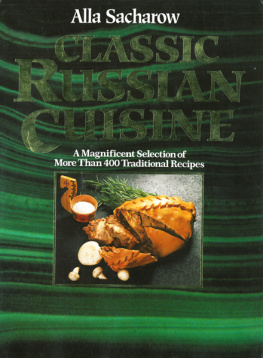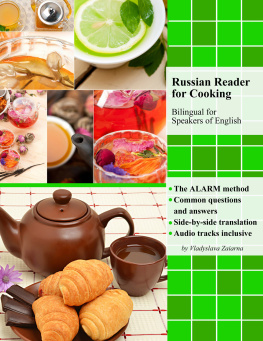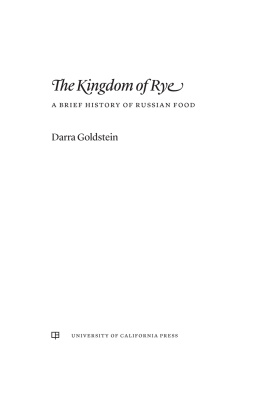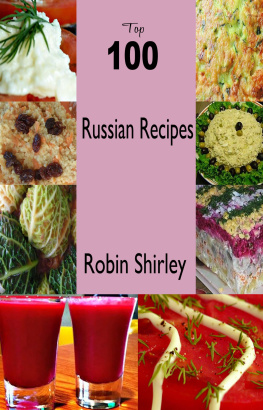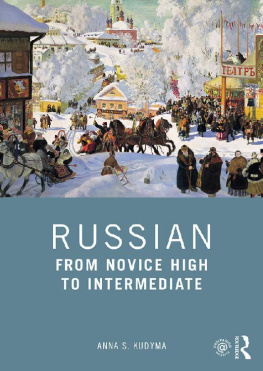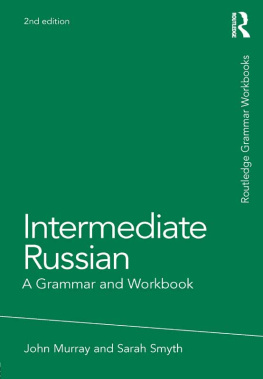Alla Sacharow - Classic Russian Cuisine
Here you can read online Alla Sacharow - Classic Russian Cuisine full text of the book (entire story) in english for free. Download pdf and epub, get meaning, cover and reviews about this ebook. year: 1993, publisher: Arcade Publishing, genre: Home and family. Description of the work, (preface) as well as reviews are available. Best literature library LitArk.com created for fans of good reading and offers a wide selection of genres:
Romance novel
Science fiction
Adventure
Detective
Science
History
Home and family
Prose
Art
Politics
Computer
Non-fiction
Religion
Business
Children
Humor
Choose a favorite category and find really read worthwhile books. Enjoy immersion in the world of imagination, feel the emotions of the characters or learn something new for yourself, make an fascinating discovery.
- Book:Classic Russian Cuisine
- Author:
- Publisher:Arcade Publishing
- Genre:
- Year:1993
- Rating:4 / 5
- Favourites:Add to favourites
- Your mark:
- 80
- 1
- 2
- 3
- 4
- 5
Classic Russian Cuisine: summary, description and annotation
We offer to read an annotation, description, summary or preface (depends on what the author of the book "Classic Russian Cuisine" wrote himself). If you haven't found the necessary information about the book — write in the comments, we will try to find it.
Classic Russian Cuisine — read online for free the complete book (whole text) full work
Below is the text of the book, divided by pages. System saving the place of the last page read, allows you to conveniently read the book "Classic Russian Cuisine" online for free, without having to search again every time where you left off. Put a bookmark, and you can go to the page where you finished reading at any time.
Font size:
Interval:
Bookmark:
RUSSIAN
CUISINE

Ursula Zilinsky and Courtney Searls-Ridge

Baroness Elissabeth von Cramer-Klett
Josef and Anne Riedmiller
Helga Rocchling
Tomara and Leonid Winokurow
The accompanying text was written by Erni Gehrig, who also edited the recipes. Copyright 1989, 2012 by Wilhelm Heyne Verlag Translation copyright 1993, 2012 by Arcade Publishing, Inc. All Rights Reserved. No part of this book may be reproduced in any manner without the express written consent of the publisher, except in the case of brief excerpts in critical reviews or articles. All inquiries should be addressed to Arcade Publishing, 307 West 36th Street, 11th Floor, New York, NY 10018. Arcade Publishing books may be purchased in bulk at special discounts for sales promotion, corporate gifts, fund-raising, or educational purposes.
Special editions can also be created to specifications. For details, contact the Special Sales Department, Arcade Publishing, 307 West 36th Street, 11th Floor, New York, NY 10018 or . Arcade Publishing is a registered trademark of Skyhorse Publishing, Inc., a Delaware corporation. Visit our website at www.arcadepub.com. 10 9 8 7 6 5 4 3 2 1 Library of Congress Cataloging-in-Publication Data is available on file. ISBN: 978-1-61145-748-3 eISBN: 978-1-61145-748-3 Contents
Accounts of food shortages, together with images of long lines of people waiting for the most basic foodstuffs, should not blind us to the fact that, in earlier times, Russians ate heartily and indeed richly. Alia Sacharow has done a great service by reminding us how important this cuisine wasand is. It seems fitting to approach the recipes in this elegant book of cuisine from greater Russia as one would the paintings in a museum, paying homage to an art and enjoying what once was in its full historical context. The reader may be surprised at the often extraordinary list of rich ingredientslarge quantities of eggs, butter, heavy cream, chicken or goose fat. Keep in mind that the Russian gastronomy recreated here emanates from centuries of glorious eating ceremonies predating our concerns with weight and cholesterol. What was once the norm has in many instances become today s taboo.
In bringing these remarkable Russian recipes to North America, we were tempted to adapt all 550 to today's western dietary demands. But in order to preserve their integrity as well as authenticity, we opted to leave them as they were. Those who have dietary concerns should feel free to substitute low- or nonfat and no-cholesterol ingredients. For example, light cream or even skim milk or nonfat yogurt could be used when the recipe calls for heavy cream. Margarine may be substituted for butter. Or the original rich, cholesterol-laden ingredients could simply be used in more modest quantities.
Some of the author s ingredients may be difficult to obtain. Certain fish, for example, are limited to specific geographic areas. Substituting another type of fish is acceptable, so long as it approximates the flesh consistency of the fish called for in the recipe. For descriptions of other ingredients that might pose difficulties, as well as suggestions on where to find the more unusual ones, refer to the following list: Almond milk: Available in health food stores and used in the preparation of pastry or sauces. Bitter almonds: Rare in the United States. Black radish: A long tuberlike radish with black exterior. Black radish: A long tuberlike radish with black exterior.
Unlike the little red radish, its peel must be discarded before use. May be obtained in specialty grocers. Crayfish: Though popular in Russia, crayfish are not always available everywhere here, except maybe in New Orleans. Recommended substitutions are crabmeat, shrimp, or a combination of the two. Gooseberries: A green berry with fuzzy outer skin, the gooseberry has a delicious and tart taste. Groats: Grain exclusive of hull; a term also used to refer to cooked cereal. Groats: Grain exclusive of hull; a term also used to refer to cooked cereal.
Available in health food stores. Kvass: A popular nonalcoholic beverage made from various grains, fruits, and vegetables and used as an ingredient in a number of cold dishes and sauces. Beginning on page 263 there are several recipes for kvass. Millet: A cereal available in health food stores. Nettles: Mostly unavailable in American stores. Orange blossom water: Available in most health food stores. Potato flour: Available in health food stores. Potato flour: Available in health food stores.
If unavailable, substitute with cornstarch. Quark: A Russian dairy product, close in consistency to American farmer cheese, ricotta cheese, or cottage cheese. Quark is available in specialty stores. Substitute with the American equivalent if not available. Rowanberries: Difficult to find outside Russia. Soup greens: A combination of herbs such as parsley, thyme, and dill, and root vegetables such as turnips, rutabagas, carrots, parsley roots, celery roots, and leeks in any proportion, depending on availability. Soup greens: A combination of herbs such as parsley, thyme, and dill, and root vegetables such as turnips, rutabagas, carrots, parsley roots, celery roots, and leeks in any proportion, depending on availability.
Soup greens are mostly used in soups and broths and impart a wonderful flavor. A bunch of soup greens means about 1-2 pounds. Wheat berries: A cereal available in health food stores. A final note: Whenever baking or oven roasting, be sure to preheat the oven for 15 minutes.
Perhaps it is this separation that has fueled her passion for sustaining the rich traditions of Russian cuisine that her mother and grandmother so reverently passed on to her. Russian gastronomic ceremonies are regarded as all important. Much care and time are given to celebrating traditional feasts such as Easter, Lent, and many more. Days of preparation during the Orthodox Easter season culminate in a meal that is a gastronomic encyclopedia beyond the comprehension of anyone who has not experienced it firsthand. Alia has prepared every recipe in this book from start to finish, not in her own apartment with familiar equipment, but in a test kitchen. The 550 recipes offered here are only the tip of the iceberg.
She has translated thousands more. Ask her if she knows how to prepare them all and she will answer, nonplussed, but of course. Personally, I think it is a pity that some of the more exotic and colorful recipes, such as horse stomach Tartar or stuffed pork intestines (known colloquially as, of all things, Nanny), fell victim to the selection process. But today, who would bother to cook anything that unique when it is so much easier to reach for the daily ubiquitous hamburgerthe same the world over? In the past, traditional Russian cuisine made use of every part of the animals slaughtered for food. Everything from head to tail was eaten, and recipes abound for every single part of the animal. The long fasting seasons of the Orthodox church have led to a separate vegetarian cuisine.
Font size:
Interval:
Bookmark:
Similar books «Classic Russian Cuisine»
Look at similar books to Classic Russian Cuisine. We have selected literature similar in name and meaning in the hope of providing readers with more options to find new, interesting, not yet read works.
Discussion, reviews of the book Classic Russian Cuisine and just readers' own opinions. Leave your comments, write what you think about the work, its meaning or the main characters. Specify what exactly you liked and what you didn't like, and why you think so.

